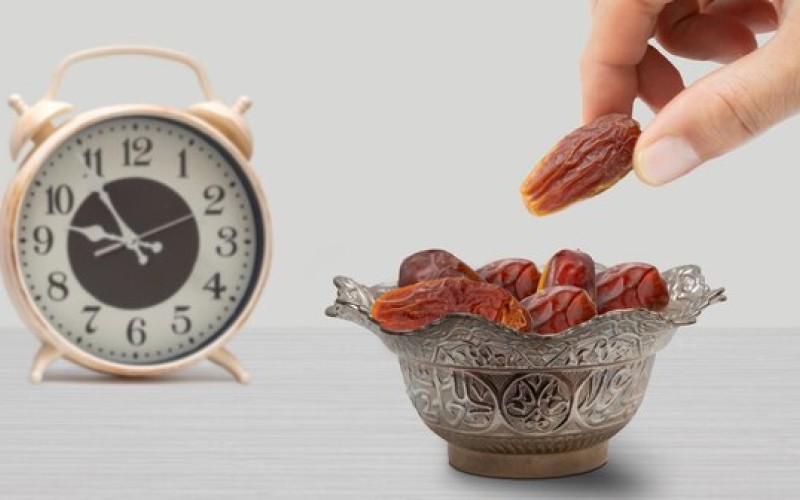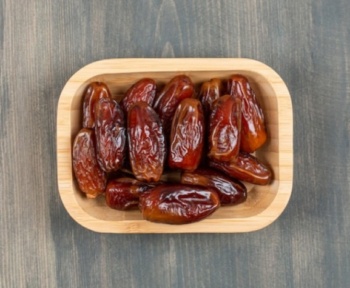Introduction
Dried dates are like nature’s candy — sweet, chewy, and packed with nutrients. Whether you’re tossing them in smoothies, baking them into treats, or simply munching on them as a snack, they’re versatile and satisfying. But, like all foods, dried dates don’t last forever. So, if you’re wondering how long they stay fresh and how to store them properly, you’ve come to the right place. Let’s dive in!
What Are Dried Dates?
In a nutshell, dried dates are just fresh dates that have been dehydrated. By removing the moisture, the drying process preserves the fruit for longer. The result? A naturally sweet, chewy snack that’s rich in fiber, potassium, and other good-for-you nutrients. Dried dates aren’t just a snack, though — they’re great in smoothies, desserts, salads, or even stuffed with nuts. Think of them as a little powerhouse of goodness.

How Long Do Dried Dates Last?
Now, the question on everyone’s mind: How long can you keep dried dates around before they go bad? Well, it depends on where you store them. Here’s a simple breakdown:

- Room Temperature: Dried dates will last about 6 months if kept in an airtight container. However, if you live somewhere warm or humid, they may spoil sooner. So, it’s always best to check them now and then.
- Refrigeration: Pop them in the fridge, and they can be kept for one year. This is perfect if you want to keep them around a bit longer without worrying about spoilage.
- Freezing: For the long haul, freezing is your best bet. When frozen, dried dates can last for up to two years—yep, two years! So, if you’ve bought a bulk pack, you don’t have to worry about them going bad for a while.
What Affects the Shelf Life of Dried Dates?
Several things can affect how long your dried dates stay fresh. Knowing these factors helps you make the most out of your dates before they lose their sweetness.
- Temperature: Heat can make dried dates go bad faster. Store them in a cool place—not too hot, not too cold. Think of it as finding that sweet spot where they’re happiest.
- Air Exposure: Dried dates exposed to air will lose their flavor and texture and can even spoil. The key is to keep them sealed tight in an airtight container.
- Humidity: Moisture is the enemy. It can cause mold or other unpleasant things. Make sure your storage spot is dry and free from any moisture.
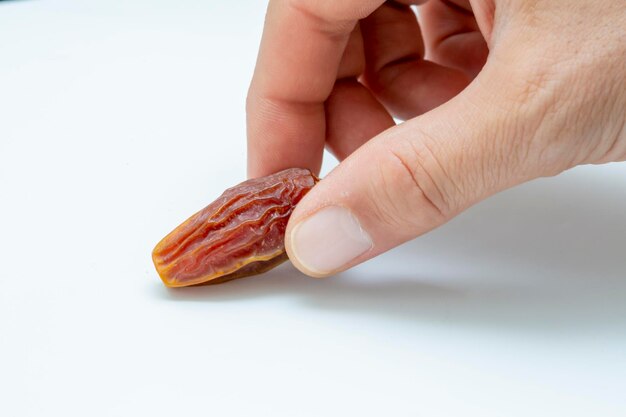
How to Store Dried Dates
Storing dried dates properly is crucial for maintaining their quality. If you want to keep them fresh for as long as possible, here’s how to do it:
Use Airtight Containers
The best way to store dried dates is in an airtight container. It prevents air and moisture from getting in, which can cause them to spoil. Whether it’s a glass jar, a resealable plastic bag, or a plastic container, make sure it’s sealed tight.
Vacuum Sealing for Long-Term Storage
Vacuum sealing is a fantastic option if you want to store your dates for an extended period. It removes air from the packaging and prevents freezer burn. If you’ve bought dates in bulk (or want to make sure they last), vacuum sealing is your friend.
Ziplock Bags or Glass Jars
No vacuum-sealer? No problem. Ziplock bags or glass jars also work well for storing dates. Just remember to press out as much air as you can before sealing them.
Store in a Cool, Dry Place
For short-term storage, a cool, dry pantry or cupboard is ideal. If you live in a warm area or want them to last a bit longer, the fridge or freezer is a safer bet.
How to Freeze Dried Dates
Freezing dried dates is a great way to keep them fresh for the long term. Here’s a quick guide on how to do it:
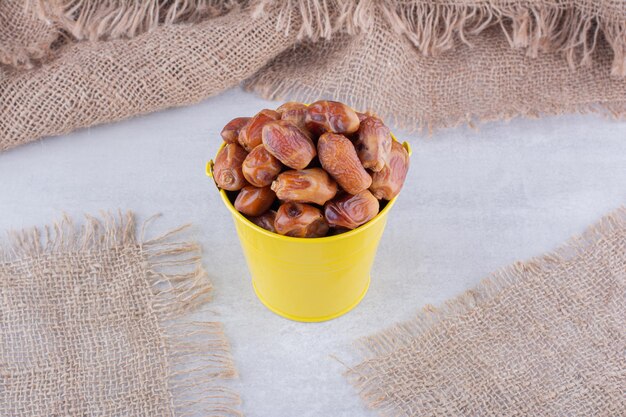
Why Freeze Dried Dates?
Freezing is perfect if you want to extend the shelf life of dried dates beyond what regular storage can offer. When frozen, they can last up to two years without losing much flavor or texture.
Steps to Freeze Dried Dates
- Remove the Pits: If your dates still have pits, it’s best to remove them before freezing. This way, they’re easier to snack on when you’re ready.
- Wrap Them Up: Wrap each date individually in plastic wrap or parchment paper to keep them from sticking together in the freezer.
- Use Freezer-Safe Bags or Containers: After wrapping, store the dates in freezer-safe bags or airtight containers. This prevents freezer burn and keeps them fresh.
How to Thaw Frozen Dried Dates
Thawing frozen dried dates is easy. Just take them out of the freezer and let them sit at room temperature for a couple of hours. If you’re in a rush, you can microwave them or soak them in warm water for a quick thaw.

Dried Dates vs. Other Dried Fruits
How do dried dates stack up against other dried fruits? Here’s a comparison of their shelf life and storage:
Dried dates hold their own here. They last just as long as raisins and figs when stored properly, but they have the bonus of being naturally sweeter and packed with fiber.
How to Tell if Dried Dates Have Gone Bad
Even though dried dates have a long shelf life, it’s still important to check them before eating. If they’ve gone bad, they’ll show a few telltale signs:
- Mold: If you spot mold, it’s time to throw them out.
- Off Smell: If they smell sour, rancid, or just “off,” toss them.
- Changes in Texture: Dried dates should be soft and slightly sticky. If they’re hard or overly dry, they’ve likely lost their freshness.
Packaging and Its Role in Shelf Life
The type of packaging used for dried dates matters more than you might think. If the packaging isn’t airtight, the dates will lose freshness much faster. If you’re buying them, opt for vacuum-sealed or airtight packaging for longer shelf life. If you buy in bulk, transfer them to airtight containers to maintain their quality.
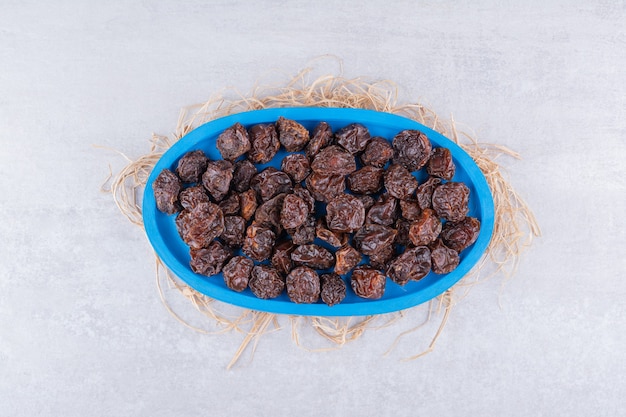
Choosing the Right Packaging
- Airtight Packaging: Keeps out air and moisture, maintaining freshness.
- Vacuum Sealing: Perfect for long-term storage.
- Eco-Friendly Packaging: If you care about sustainability, choose dried dates packaged in eco-friendly materials.
Interview with Sarah Williams, Food Storage Expert: Best Practices for Storing Dried Dates
“The key to prolonging the shelf life of dried dates is to store them in airtight containers and keep them in a cool, dry place away from direct sunlight,” says Sarah Williams, a food storage expert with over 10 years of experience in food preservation.
Conclusion
Dried dates are a delicious, healthy snack that can last for months if stored properly. Whether you keep them at room temperature, pop them in the fridge, or freeze them, the key is to store them in a way that protects them from air and moisture. With a bit of care, your dried dates will stay fresh and ready to enjoy for a long time.
FAQs
In the fridge, dried dates can last for up to 1 year.
Yes, but only if they don’t show signs of spoilage like mold or an off smell.
Yes, freezing is a great way to store dried dates for up to two years.
Look for mold, strange smells, or a hard texture. If any of these are present, it’s time to remove them.
Dried dates can last for a few months at room temperature if appropriately stored in an airtight container. However, if exposed to humidity, heat, or air for prolonged periods, they may spoil quickly. To keep them fresh, it’s best to store them in a cool, dry place away from direct sunlight.
Dried dates can last for a long time, but if they’re past their prime, you might notice signs of spoilage like an off smell, mold, or a change in texture (they should be soft and slightly sticky). If they appear complicated, dry or smell rancid, it’s best to discard them.
While dried dates don’t need to be refrigerated, storing them in the fridge will help extend their shelf life for up to a year. If you’re not going to devour them, it’s a good idea to keep them in the fridge to preserve their freshness and taste.
Yes! Freezing dried dates is a great way to store them for long periods. When stored properly in an airtight container or vacuum-sealed bag, they can last up to two years in the freezer without losing their flavor or texture.
To store dried dates for maximum freshness, keep them in an airtight container in a cool, dry place away from sunlight and humidity. If you want to keep them for even longer, refrigerate them or freeze them for long-term storage.


